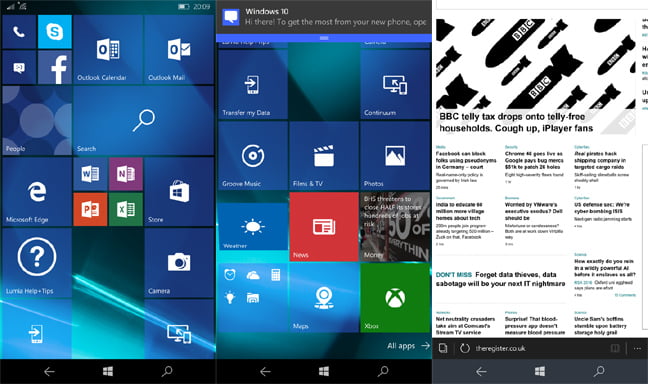

Review Microsoft admitted defeat in the phone wars last summer, but a mobile cut still remains strategic to the company – albeit more for tablets and “detachables” rather than phones, where full-fat Windows 10 is too bulky.
You’ve heard the euphemism “collateral damage.” Windows phone owners today are “collateral users” – they just happen to be standing in the path of a major platform update.
Being collateral users means Windows Phone owners will need to get accustomed to two things, neither of which may be pleasant.
Windows 10 for Mobile devices is a permanent work in progress, which means it’s never going to be finished. And the fit and finish they’re used to in WP 8.1 (which is smooth, fast and reliable and a UX optimised for one-handed use) is unlikely to return.
I’ve used the latest build of Windows 10 for phones – 10586.122 – for several days as a main phone, on Microsoft’s two flagship devices. For a few hours, I updated them to the overnight update, Build 10586.164. The builds are very close to final code, a kind of pre-flight check before takeoff. They bring significant improvements in reliability, performance and battery life. However, bugs remain.
Notably, in the effort to push this troubled project out, Microsoft has deprecated two key Windows features. I found both Cortana and Windows Hello face recognition had been disabled by default. Using Hello still significantly impairs performance and battery life – so it’s a wise move by Microsoft to disable it.
It’s a pity. If and when facial recognition works, it adds a new dimension to security and ease of use. But as with previous W10M builds, the “beta” drained the battery flat looking for a face. It only registered about a 50 per cent success rate in any case. Fingerprint scanners are more mature and don’t require quite so much hardware – remember that Hello has an infrared scanner to detect whether you’re holding up a mugshot.
Cortana has promised much for some time now (two years), but is a project that has failed to fulfil that promise, and unfortunately adds next to nothing to the Windows experience – at least, not for this UK user.
[“Source-theregister”]

